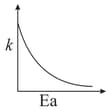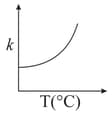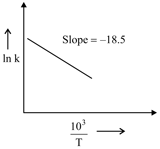HARD
JEE Main
IMPORTANT
Earn 100
Consider the given plots for a reaction obeying Arrhenius equation (and are rate constant and activation energy, respectively )
(I)

(II)

(I)


(a)I is wrong but II is right
(b)Both I and II are wrong
(c)I is right but II is wrong
(d)Both I and II are correct
50% studentsanswered this correctly

Important Questions on Chemical Kinetics
MEDIUM
JEE Main
IMPORTANT
For the reaction of with , the rate constant is at and at . The activation energy for the reaction, in is:
MEDIUM
JEE Main
IMPORTANT
A bacterial infection in an internal wound grows as , where the time is in hours. A dose of antibiotic, taken orally, needs 1 hour to reach the wound. Once it reaches there, the bacterial population goes down as . What will be the plot of vs after hour?
EASY
JEE Main
IMPORTANT
The rate law for the reaction below is given by the expression
If the concentration of is increased from , keeping the value of at , the rate constant will be:
HARD
JEE Main
IMPORTANT
The reaction follows first order kinetics. The pressure of a vessel containing only was found to increase from 50 mm Hg to 87.5 mm Hg in 30 min. The pressure exerted by the gases after 60 min. Will be (Assume temperature remains constant) :
MEDIUM
JEE Main
IMPORTANT
Which one of the following given graphs represents the variation of rate constant with temperature for an endothermic reaction?
MEDIUM
JEE Main
IMPORTANT
The rate constants for decomposition of acetaldehyde have been measured over the temperature range . The data has been analysed by plotting vs graph. The value of activation energy for the reaction is . (Nearest integer) (Given : )

MEDIUM
JEE Main
IMPORTANT
For a first order reaction, the time required for completion of reaction is '' times the half life of the reaction. The value of '' is
(Given: and )
HARD
JEE Main
IMPORTANT
For a given chemical reaction . Concentration of changes from to in Rate of appearance of is times the rate of disappearance of which is twice the rate of disappearance . The rate of appearance of has been experimentally determined to be Therefore the rate of reaction is____ (Nearest Integer)
